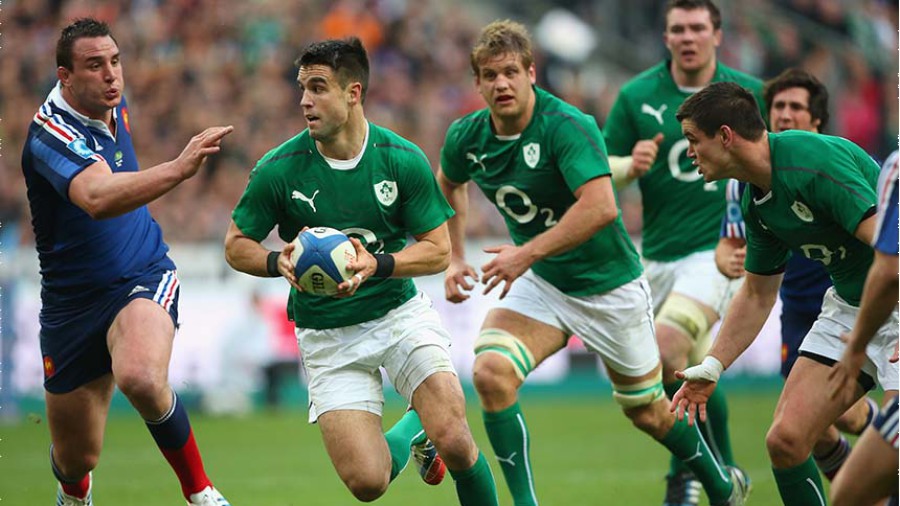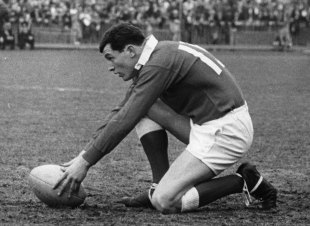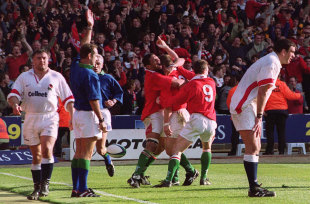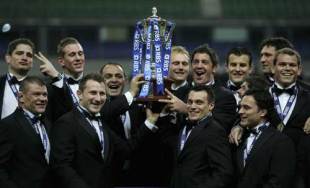|
Scrum Sevens
Greatest Five & Six Nations Championship finales
Huw Richards
March 18, 2015

Conor Murray and Ireland ran France ragged to win last year's Six Nations in dramatic style © Getty Images
Enlarge
If you'd asked the TV schedulers for their dream scenario for the final weekend of the Six Nations, they'd probably have come up with something like "four teams still in contention, and the main three going off like the contenders in downhill skiing, one after another in reverse order, with the current leader going last". But drama and final days were constant companions even when looser scheduling could mean that it might be only a single match. Scrum Sevens looks at some of the most memorable... 1966 France looked to be cruising to the championship as they went into the final 10 minutes of their last match in Cardiff with an 8-6 lead. Wales had won only one of their last eight meetings and showed no sign of changing that pattern as the French pressed for a deciding score. Outside-half Jean Gachassin threw out a long pass and powerful Welsh wing Stuart Watkins intercepted to run 80 yards for a try. A French championship became a Welsh one, and the defeat a landmark in France's long-running battle over playing styles, with the brilliant Boniface brothers dropped for ever. Like baseball's famous 'Shot Heard Round the World', the incident forms the opening of a significant novel, in this case Adios by Kleber Haedens. 1967

Keith Jarrett made a stunning debut for Wales against England
© Getty Images
Enlarge
Another weekend on which three teams cherished serious title ambitions - and the one left standing was probably the least expected . Victory over France at Lansdowne Road would have given Ireland at least a share of the title, but they were undone by the boot of diminutive French outside-half Guy Camberabero who landed two drop goals in an 11-6 win for the visitors. England also went into the last day as contenders and were away to a Wales team who had lost all three matches so far. Form went out of the window, and so did sections of the record books as teenage Welsh full-back Keith Jarrett scored 19 points in perhaps the most spectacular debut in championship history and Wales' 34-21 win left the French as outright champions. 1973 Ireland v France again, with the French arriving in Dublin needing only a draw to take the title. They trailed for most of a dour, windswept struggle with Tony Ensor and Mike Gibson landing penalties for the Irish, but in injury time wing Jean-Francois Philiponeau - killed by lightning during a match three years later - went over for a try which, if converted, would under the scoring values of the time have given France the draw they needed. Outside-half Jean-Pierre Romeu had kicked everything that year, but he fluffed a comparatively simple kick. Maybe Romeu had a sense of history, because Ireland's win meant that the 1973 season finished in a unique five-way tie, each team having won its two home matches and lost both away. 1999

Scott Gibbs' try sparked bedlam at Wembley
© Getty Images
Enlarge
Everyone remembers Scott Gibbs charging unstoppably for England's line at Wembley and Neil Jenkins' icy-cool conversion beginning England's inverse Triple Crown - Grand Slams blown on consecutive final days against each of the Celtic nations in turn. But the last Five Nations weekend of all wasn't just about that match. Spread over two days, it had already seen an astonishing Scottish blitz of five tries in 18 minutes in Paris, leading to a 36-22 win which - when England suddenly tripped - left the Scots as the last Five Nations champions. Neither winner could remotely have been predicted - a year earlier each had gone down by more than 50 points in the corresponding fixture. 2006 France and Ireland were often in in lockstep at the top of the table in the mid 2000s and came to the final round, when France were in Cardiff and Ireland at Twickenham, with three wins each. France had a clear edge on points difference, but that hardly looked relevant as Wales led 13-6 at half-time and 16-11 with five minutes to go. Then Freddie Michalak chipped over the top and Florian Fritz was first to the touchdown. Jean-Baptiste Elissalde converted for the lead then added a penalty. Ireland, provisional champions with five minutes left in Cardiff, now had to win by 34 at Twickenham. They won all right, but by a mere four points, 28-24, to leave France as champions. 2007

France lifted the Six Nations trophy after a dramatic climax
©
Enlarge
If the Irish thought that was cruel, it is as well they could not see forward 12 months. Again Ireland and France both had three wins, although this time France led by only four on points difference. Ireland went first in Rome and overran the Italians, leading 46-12 with 10 minutes to go. Knowing every point might matter they went on pressing and conceded two late tries, cutting the final margin of victory to 51-24. France kicked off in Paris against Scotland knowing they needed a 24-point win and led by 20 into the final moments of the match, which saw back rower Elvis Vermeulen plunge for the line. There was an agonising wait before the TMO, an Irishman, confirmed the score. If there was ever a year in which the final day scheduling materially affected the outcome of the title, it was this one. 2014 Still pretty fresh in the memory and confirming that great Six Nations finishes more often than not do not involve Grand Slams. England went first in Rome, tied on points with Ireland but 49 behind on points difference. They made a heroic effort, which Warren Gatland may well scrutinise before the coming weekend, to close the gap and fell not far short, scoring seven tries, all converted by Owen Farrell, in a 52-11 win. That still left Ireland the little matter of winning in Paris for only the second time in 42 years in order to take the title in Brian O'Driscoll's final test. And they did it, just, but not before France had led three times and thought they had pinched it in the last minute before the final pass to Damien Chouly was ruled forward. © ESPN Sports Media Ltd
|
Live Sports
Communication error please reload the page.
-
Football
-
Cricket
-
Rugby
-
- Days
- Hrs
- Mins
- Secs
F1 - Abu Dhabi GP
Abu Dhabi Grand Prix December 11-131. Max Verstappen ()
2. Valtteri Bottas (Mercedes)
3. Lewis Hamilton (Mercedes)
4. Alexander Albon ()
5. Lando Norris ()
6. Carlos Sainz Jr ()
-
ESPNOtherLive >>
Snooker - China Open
Tennis - Miami Open

